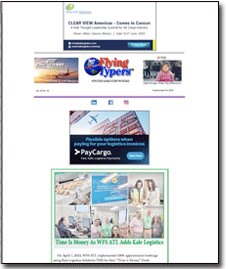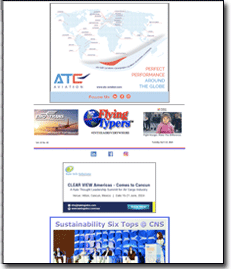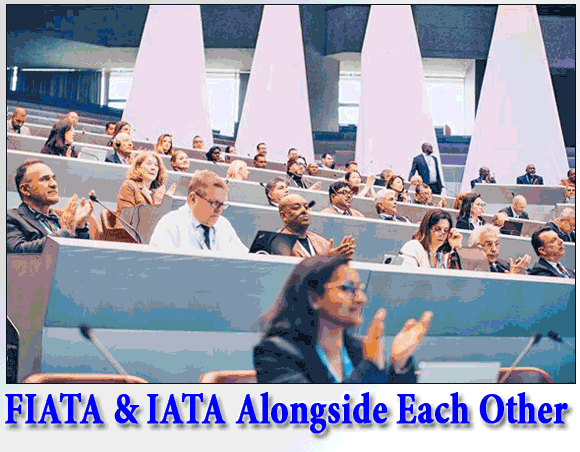 |
Time goes by, things change and the conditions
of the business go up and down, but FIATA meetings show stability, surprising
even for those who participate. When FIATA
members meet again, year after year, all their doubts, issues and questions
suddenly are lifted into a collaborative atmosphere that they share, celebrating
with renewed enthusiasm their reunion, one global meeting after another.
This atmosphere thrilled me back in 1992, always coming back in different
waves, again and again, in particular at the Headquarters’ meeting
(HQ) in spring, which mainly attracts “the usual suspects”.
The FIATA World Congress (WC) is a much larger event and attracts a lot
of new participants, but the HQ is the real playground of those who “make”
FIATA what it is, so the degree of camaraderie is at its highest in springtime.
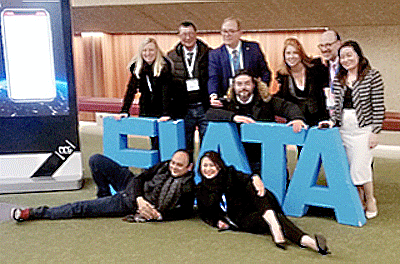 Some
250 FIATA delegates from 60 different countries or more met in Geneva
April 22nd to 26th. A dream for many other organisations, these are actually
small numbers by FIATA standards. Please consider this happens at least
four times a year, including two field meetings and the much bigger World
Congress: a remarkable show of members’ participation in my view.
At the opening the faces and the comments were the same as ever, yet always
new. Hopefully it will always be like this for many more years to come. Some
250 FIATA delegates from 60 different countries or more met in Geneva
April 22nd to 26th. A dream for many other organisations, these are actually
small numbers by FIATA standards. Please consider this happens at least
four times a year, including two field meetings and the much bigger World
Congress: a remarkable show of members’ participation in my view.
At the opening the faces and the comments were the same as ever, yet always
new. Hopefully it will always be like this for many more years to come.
This is how FIATA introduced the spring
session to its own members, under the motto Uniting for Resilience: “The
2024 FIATA HQ Meeting will delve into critical themes shaping the current
logistics industry (abridged): contractual practices in maritime supply
chains, the importance of data quality and electronic data transfer, regional
challenges in airfreight, and new customs and border clearance regulations
(abridged)) the future workforce of the industry, focusing on attracting
and nurturing young talent.” The objectives stipulated by the organisation
for this meeting were listed as follows: “FIATA will address challenges
and opportunities such as artificial intelligence, the Digital FIATA Multimodal
Bill of Lading (Digital FBL), multiple filing implementation in pre-loading
advance cargo information (PLACI), and Authorised Economic Operator (AEO)
programmes.”
In 2026 FIATA will be 100 years old, a clear
sign of impressive stamina, in spite of sirens evoking the demise of freight
forwarders every x-amount of years. I have periodically heard and read
such comments in my personal experience for 50 years by now. This must
be working as medicine for us. We are all here, alive and kicking: we
used to work with telexes and now we are experimenting with AI. Sometimes
I dream that in 2626 FIATA will be 700 years old and will call its members
to the World Congress; will it be held on Mars, Europa or Proxima B of
Alpha Centauri? Who knows . . . Well, let us get back to Earth in the
spring of 2024: no need to confront the Alien from outer space yet.
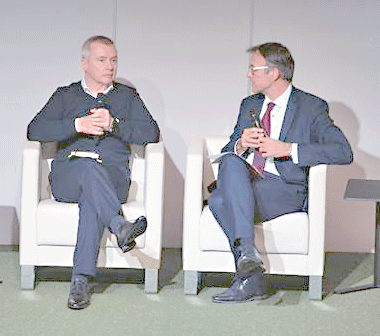 The
HQ started on April 22nd with a bang: Willie Walsh (left) of
IATA was invited to sit and chat with DG Stéphane Graber (right)
side by side at the magnificent Geneva CICG and the fact that he actually
accepted the invitation was conspicuous after the uncertainties the relationship
went through in recent times. The conversation was intriguing: the least
I could say. In FIATA’s own words: “The IATA Director General,
Mr. Willie Walsh, will join the FIATA Director General for an exclusive
fireside chat at the opening session of the 2024 FIATA HQ Meeting! This
is an excellent opportunity for FIATA Members to (abridged) discuss the
many common goals shared by FIATA and IATA, such as: best practices in
handling dangerous goods such as ubiquitous lithium batteries and unit
load devices (ULDs); digitalisation, with FIATA’s digital document
standard and IATA’s One Record; sustainability and decarbonisation,
and scaling up the availability of sustainable aviation fuel (SAF) and
other such environmentally friendly fuel options for all modes of transport;
nurturing young professionals in air cargo and transport sector.” The
HQ started on April 22nd with a bang: Willie Walsh (left) of
IATA was invited to sit and chat with DG Stéphane Graber (right)
side by side at the magnificent Geneva CICG and the fact that he actually
accepted the invitation was conspicuous after the uncertainties the relationship
went through in recent times. The conversation was intriguing: the least
I could say. In FIATA’s own words: “The IATA Director General,
Mr. Willie Walsh, will join the FIATA Director General for an exclusive
fireside chat at the opening session of the 2024 FIATA HQ Meeting! This
is an excellent opportunity for FIATA Members to (abridged) discuss the
many common goals shared by FIATA and IATA, such as: best practices in
handling dangerous goods such as ubiquitous lithium batteries and unit
load devices (ULDs); digitalisation, with FIATA’s digital document
standard and IATA’s One Record; sustainability and decarbonisation,
and scaling up the availability of sustainable aviation fuel (SAF) and
other such environmentally friendly fuel options for all modes of transport;
nurturing young professionals in air cargo and transport sector.”
President
Turgut Erkeskin opened the meeting and mentioned in his short and effective
speech the core values of the organisation: excellence, innovation, digitalisation,
collaboration and responsibility. Turgut was followed by an informative
message given by the Director General, Stéphane Graber. The two
introductions re-focussed the conversation in particular on the market
conditions, innovation, digitalisation, human resources and the collaboration
programme.
Above we were talking of actions that change but at the same time remain
the same . . . Here is one that apparently never changes and seems to
continue orbiting around its centre: the never ending discussion on the
relationship between freight forwarders and airlines and the recent attempt
to modernise it. After 10-year-plus talks about the modernisation programme
and the sudden stop during the pandemic period, we have a new phase now,
apparently benefiting from a more controllable atmosphere. What remains
to be seen is what kind of results will be achieved in the end, as one
of the senior representatives of the Airfreight Institute of FIATA had
to observe after listening to the session. This was surely not the only
topic that was discussed by the two directors, but it was understandably
the most important for many, as clearly shown by the poll held at the
Airfreight Institute meeting.
What follows in this article is a summary of
the conversation that I have heard and tried to capture in its essence.
My hope and expectation is to give our readers a faithful version of the
pleasant meeting hosted by FIATA. This notwithstanding, if we receive
any comments that any of the statements may have been incorrectly understood
or transposed, we shall surely rectify without hesitation and publish
any possible amendment request.
Dr. Graber introduced IATA’s DG Willie
Walsh by saying that he was unable to adequately express how pleased and
grateful he was to have him at FIATA. Stéphane took note of Mr.
Walsh’s impressive career, with some 40 years in the airline industry.
Both exchanged small anecdotes regarding their early morning trips on
Geneva’s public transport. Soon after, Graber evoked the good dialogue
that was created at the latest World Cargo Symposium. With a mind set
on the global environment he said he had asked FIATA Members to share
questions in preparation of this session: in focus were market trends,
mindful of the turbulent time for the industry evoked by the FIATA President
in his introduction. Graber was aptly mentioning that the industry had
just experienced “not only a pandemic, but also some geopolitical
uncertainties, conflict in different parts of the world, environmental
incidents, e.g. the recent flooding in Dubai . . . We see that we have
a lot of uncertainties and volatility in the market and this is also having
an impact on air freight. In light of this, how do you see the preparation
of the aviation industry to face these increased occurrences? And these
will probably continue in the future . . . ”
IATA’s DG Walsh had no hesitation
to get in tune with the conversational atmosphere: “I would agree
with you: it will continue into the future. When I listen to the list
of things you read out there, I'm almost thinking that these are business-as-usual
challenges that we face, because I think as an industry [in time] you
will have seen some, if not all, of these issues at some stage previously.
Having gone through the period of the pandemic helps to put these into
context. The ability to recover is much better today than it used to be,
because we've learned from past disruptions and past crises. When I first
joined the industry back in the late 70s and 80s, it was a very cyclical
industry. And I think those of us in the airline industry probably took
the view that there was very little that we could do to influence that.
In good times, it was great. In bad times, it was terrible. I think we've
realised, probably going back to what happened in 2001 and since then,
that there are a lot of steps and measures we can take that can significantly
improve the quality of our business. That can significantly influence
what happens to our business during these periods of crisis and period
of disruption. And . . . the sooner you address the challenge that you
face, the better it is for your business. If you look at what the airline
industry went through, it was slightly different on the cargo side, because
during the period of the pandemic, passenger traffic collapsed completely,
whereas I think people realised just how important aviation was for the
transport of critical goods and services. There was a much greater appreciation
for the cargo side of the business. The fact that there are so many airlines
still in business today, is a reflection of the speed with which they've
responded to the crisis, and the measures they took. Many of these measures
were very uncomfortable, very tough, but they had to be taken in order
to survive what was the deepest and most prolonged crisis we have seen.”
Unsurprisingly Stéphane Graber showed
his appreciation: “Thank you, very interesting. I remember two years
ago at the Executive Summit in the World Cargo Symposium, we were discussing
about how we can keep this momentum for the cargo industry, because suddenly
it appears that ‘everybody knew that cargo exists’. I had
some questions coming to me asking where we stand now, because they have
the impression that we start again to forget the importance of cargo.”
This was Mr Walsh’s reply: “I don't think so. Cargo is absolutely
critical to the survival of the industry. From an industry point of view
. . . the period between 2010 and 2019 . . . was the first time that the
industry was profitable in 10 consecutive years. During that period, cargo
revenues represented 13% of total revenues. In 2021, cargo revenues were
over 40% of the industry's revenues. It's not just about revenue, it was
the cash that was bringing . . . during that period, the cash that was
the critical issue. Cargo, fortunately, was a cash lifeline for the industry.”
Mr. Walsh affirmed that cargo had always
been central in his work, but said “I don't think there were many
airlines that had a full understanding of how cargo contributed to their
business. But that, as I said, changed during the period of the pandemic.”
Then the next questions: how to “make progress, particularly, [among]
the priorities you outlined: digitalisation.” In this area, admittedly,
investments in cargo had been less than on passengers’ side. It
was observed, that “if we can modernise and digitalise the cargo
business in the same way as we've been able to do on the passenger side”
perceptible benefits would entail and Walsh also noted that “we
expect cargo revenues to represent about 12% of the industry's revenues
this year.”
From the outside we could say that this
is not an easy subject for airlines, as passengers and airfreight have
often had to share their respective importance unevenly, and this is not
always an easy discussion to have, but the way the conversation continued
showed perfectly well that the two understood each other and there was
no fear to fly. This looked to me like a well-prepared conversation, where
both parties had a lot to gain by showing understanding for one another.
Mr. Walsh continued: “Where cargo contributes 12%, it shows how
important that contribution is. Every single contribution we make: dollar
of revenue, dollar of profit, dollar of cash, is critical to the industry.
So I don't think the emphasis has gone, I think it's still there. I can
tell you that when we're talking about the challenges and the priorities
and the opportunities for the industry at the IATA Board of Governors,
we are very much still talking about opportunities at the cargo and freight
centre.” Mr. Graber underlined this was good news for his members
and picked on the issue of digitalisation and mentioned the Digitalisation
Leadership Charter launched at the WCS, where expectation exists for FIATA’s
support. It was underlined that common ground exists. “I strongly
believe we'll end up pursuing the same issues, the same avenue”
was a notable one-liner Mr. Walsh pronounced, harbouring hope for “genuine
collaboration”.
The conversation moved on to other areas,
prompted by Dr. Graber: “I think . . . one also is safety security.
I think that's a very important topic for the airline. I think it's always
at the top of our priorities,” adamantly echoed from Mr. Walsh,
and understandably so. Despite 2023 being “the safest year on record”,
frustration surfaced considering that the issues suffered by Boeing invariably
seem to take the front line over the collective success of the industry.
It was noted that “it's important for every single person to understand
that they have a role to play in safety and security,” but Mr. Walsh
also voiced some concern on possible “overreaction” from regulators
“responding to political pressure. And not necessarily going to
do anything to enhance or improve the safety and security.” Mr.
Graber observed this was an area where “we are not in competition:
we could really work together.”
The conversation then moved on to HR and
training, where “we would have all the interest to also join forces.”
The ability to attract, educate and retain collaborators topped the agenda
and the challenges of DG training and other examples were mentioned. Speaking
of the IATA executives programme, the issue of gender balance surfaced
and it was noted that “we know the challenge we have in terms of
attracting more female talent into the industry . . . That's absolutely
critical.” There was expectation that the gap would be closed as
early as 2025, but nobody was actually in favour of quotas in this regard.
Yet, it was observed that “we are still, in certain areas, male
dominated, particularly in areas where talent is going to be quite scarce.
In the airline industry, the areas where I think we're most concerned
about is engineering and mechanics . . . an area that I think we really
are going to have to work on.” The positive example of IATA’s
intern programme was mentioned and there was recognition that the hierarchy
in the business should not lead to frustration or dampening of enthusiasm
in the younger professionals before it can flourish.
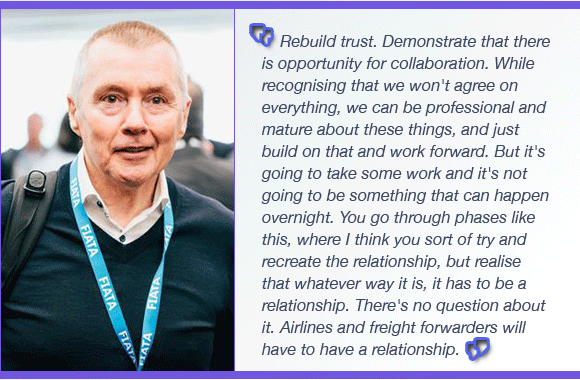 |
Continuing to explore other commonalities, Graber
made reference to the “collaboration through the IATA Cargo Agency
Program, where FIATA is participating. We have the IATA FIATA Consultative
Council that meets regularly. We participated also in the Cargo Agency
Conference. We had also very good discussions with airlines in some of
our meetings prior to that.” Some background was explained by the
DG: “there was this project that came from IATA for modernising
this program. It started with CAMP first at the Cargo Agency Modernisation
Program (CAMP). And then, unfortunately, came the pandemic.” It
was observed that both organisations went through important changes in
the period, but “we came back. And we, as you mentioned a few times
here, we think there are a lot of synergies to make and rethink this modernisation
programme, trying to make something that is modern and address all these
challenges that we just touched upon today. And we see that it's not really
competitive. It's really about working together in making our industry
more attractive and modern.” “Start again”, was the
expression everybody heard.
IATA’s DG reacted by saying: “You're
right, there was history there. And I think we diverged during that period
of the pandemic. I think there's work that needs to be done to bring it
back together again. I think we need to rebuild trust between us.”
The door appeared then open to more commonalities than differences and
the conversation continued. Here are some of the notable statements that
many of our readers could appreciate in their full value: “we have
to recognise there are things that we don't agree on. But focusing on
the things we don't agree on is going to be a waste of time. But trying
to work together on things that we do agree on. Rebuild trust. Demonstrate
that there is opportunity for collaboration. While recognising that we
won't agree on everything, we can be professional and mature about these
things, and just build on that and work forward. But it's going to take
some work and it's not going to be something that can happen overnight.
So I think the committee that has been established, I think has an opportunity
to start putting this together. And then the speed at which we make progress
I think is going to be the interesting thing. But when I listen to your
introductions and I think about the things that we're focused on, there
is a common agenda there. You go through phases like this, where I think
you sort of try and recreate the relationship, but realise that whatever
way it is, it has to be a relationship. There's no question about it.
Airlines and freight forwarders will have to have a relationship.”
Listening on, 411 additional words were
pronounced by IATA’s DG, repeating the concept that airlines and
forwarders were to have a relationship and this would be beneficial for
both. It was a passionate speech and climaxed with a clear statement:
“I'm optimistic that we can move forward in a constructive way.”
DG Graber replied: “That's a very
good, positive message. And I thank you for that. I also note that you
came here. It was really something that also showed our members that there
is also a kind of reset in the relationship. And I agree with you. We
worked, I think, hard in the last two, three years to rebuild enough trust
that we can sit here today and talk openly about the challenges of our
industry. And we need to continue that way. I think that, you know, effectively
what I see in some of our members is the question of speed, of the progress,
because there were a lot of expectations for many years that we will solve
a certain issue. And like you, I think we need to take it step by step
in a pragmatic way. But I really hope that your words today, your presence
will also help to create this trust, this confidence that the time has
changed. We are going to do something that is different, that is new,
where we can really work on the synergies and complementarity that is
also reflected in the way freight forwarders and airlines work together.”
DG Walsh said: “Well, you know, we'll
stop talking . . . ” Then Dr. Graber asked President Turgut Erkeskin
to join the conversation and express his judgement on the discussion.
The President of FIATA expressed his appreciation and reflected on the
current challenges having become the new normal, he noted that “freight
forwarders and airlines are working together day in and day out. They
have a great cooperation. And without that cooperation, actually, freight
forwarders would not exist in the air logistics. And airlines, I mean,
you have mentioned that there is a great difference between the income
from the passenger side and the cargo side. And during the pandemic, I
remember, I was hearing from Turkish Airlines that 35% of their revenue
was coming from the cargo operations. Therefore, the cooperation between
us is very crucial. And we have to bring it to certain standards, industry
standards. And we need to really look for one global air cargo programme
so that within the globalisation, within the standardisation, I mean,
this business is performed in the same manner all around the world.”
Turgut gave examples of different areas of cooperation where significant
optimisation could be achieved through enhanced cooperation and standardisation.
He mentioned that air freight being the fastest service in logistics there
is “our responsibility is to deliver the solution in the fastest
possible time.”
DG Walsh agreed that what President Erkeskin
had said was “very true. Our members work together every day. On
an individual or bilateral basis, I think the relationship between individual
freight forwarders and airlines is often extremely good and very personal.
And therefore that gives us the opportunity to build on those relationships
in a constructive way going forward. [Our relationship] proved to be the
difference between life and death during the pandemic. It proved to be
the difference between life and financial debts for the airline industry
during the period of the pandemic.”
 |
Turgut Erkeskin highlighted the function
of the freight forwarder in dealing with shippers so that products come
to the airline “in such a shape that the aircraft can accept. The
airline cannot deal with each and every shipper out there. This synergy
in between us is, in my eyes, second to none.”
Walsh agreed and mentioned his experience
as a pilot for Aer Lingus, where the expertise of the agent was crucial
to achieve the result, then concluded, “my message is a simple one.
I believe we're better serving our members working together and collaborating.
I think we're old enough, big enough, brave enough to recognise that we're
not going to agree on everything. But, let's try and focus on the areas
where there clearly is common ground and work together for the benefit
of our collective members to ensure that we continue to make this industry
successful. And to make sure that people understand just how important
it is. You know, we can never go back to decisions that were taken during
the pandemic when people thought they could stop this industry. Fortunately,
they very quickly realised how important it was to be able to transport
goods by air. But they had to learn that lesson and learn that lesson
quickly, because they didn't appreciate it when they were taking the decisions
to stop international flight. So, I think it's great that we're able to
have this dialogue and hopefully we'll be able to reflect on the progress
that we make when you invite us along maybe next year to do a repeat performance
on the stage.”
Considering the number of words written,
and considering this is not even half of those pronounced to state that
FIATA and IATA need to work together, one could conclude that mankind
is in general fascinated by its own ability to talk . . . But, on a more
serious tone, we register that IATA and FIATA have re-started their conversation
about a global programme. If the discussion cannot resume from the point
where it was interrupted, it does not precisely re-start from scratch
either, but it will need time, as was determined by DG Walsh above: we
can expect a relatively long process, despite the fact that both parties
seem to feel a sense of urgency.
The self-evident truth that freight forwarders
and airlines are bound to work together, and indeed have done so for decades,
seems to be perceived at times as a blessing and at times as expiation.
I remember many years ago – really a lot of years ago – when
we were talking about similar, if not the same concepts, a late friend
of mine said it “is like marriage: mostly you are happy, but sometimes
you have regrets.”
We all say that our industry is a people’s
industry. In that I think the relationship between freight forwarders
and airlines is the epitome of such concept: it works and manages to provide
excellent services only if both cooperate in good harmony and individually
they do it on a daily basis, but if you try to write it down in good order
. . . There was the impression that both parties had experienced some
frustration in recent times. Maybe looking for a global programme is an
attempt to create a perfect world and is uncanny? After so many years
in this business, I still do not know the right answer. Yet, this seems
to be what everyone wants and wants to invest into. Maybe the journey
is just as important as the destination? In the years this collaboration
has evolved and improved in many areas. Let us continue enjoy the journey
and see where we get.
Marco Sorgetti
Geneva April 26th 2024 |





